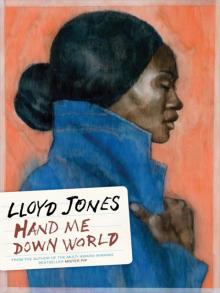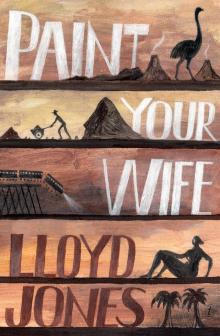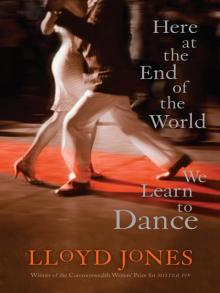- Home
- Lloyd Jones
Here at the End of the World We Learn to Dance Page 2
Here at the End of the World We Learn to Dance Read online
Page 2
On the other hand, Gardel may have been a ‘bit before her time’, as they say. Gardel is best thought of as ‘a friend of a friend’. She and Paul Schmidt were closest in time and sensibility to Anibal Troilo and Goyeneche.
Troilo’s original bandoneon sits behind glass in la Troilo sala. His signature piece ‘Danzarin’, was a favourite. Of Louise’s other friends, Julio Maria Sosa was represented by his Remington shaver, Sabina Olmos by her perfume bottles and Hugo Carril by his toiletries.
All those days and nights Schmidt was home tending to his other life, stoking the family coals, playing husband and father, Louise huddled next to her 1938 RCA Victor radio. The radio in the room next to Troilo’s looks like a small beautiful wooden chapel.
4
Rosa is the name of the little girl who used to stand in line to fill up the water bucket at La Chacarita.
She and her grandfather would catch the 39 at the corner of Paraguay and Coronel Diaz. The bus knew the way to the cemetery— they passed under the canopy of trees on Honduras, jumped the railway tracks with its tired rubbish, past the men spit-roasting meat under a scrap iron roof, past the markets. Before they turned up Maure on to Corrientes her grandfather would always look out the right-hand window for the two tenement buildings that stand like launch pads on a flattened landscape. The cemetery marked the end of the line for the bus route. After disembarking Rosa would gaze up at the grand entrance steps to the cemetery. It was like entering an opera house, elevated, and full of promise. The tug on her arm was her grandfather. She had forgotten to bring flowers. So from a florist on Guzman they would buy jasmine for Rosa to place on Gardel’s tomb.
To a child, death is a story that is not quite believable. The crypts. The floating angels. The cementerio workers. The ones in green to collect the leaves.The ones in blue with mops and buckets to wash down the steps of the huge, ostentatious family tombs. On a summer’s morning Rosa would peek down the shadowed stairs to a shrine of light. Impossible to imagine that something as small as a flower urn might contain a whole life. And once, when she saw an admirer light a cigarette for the famous singer’s bronzed hand, she understood that Gardel was not quite as dead as everyone made out.
It was the bit afterwards she looked forward to—after her grandfather had finished with washing his old shop assistant’s headstone—when they repaired to El Imperio de la Pizza. Nothing has changed. Today the café sprawls onto two busy avenues. The doors are flung open to catch the diesel fumes and the occasional whiff of fresh air.
Rosa and Schmidt always sat at the same table with the view out the doors across Avenida Corrientes to the palms outside the grand entrance to the cementerio. The old man would ease into his chair as though he’d deemed it to be his final resting place. One massive sigh and his face became immobilised. For several long minutes Rosa would divert her attention to the huge metal fans beating inside the wire cages; sitting patiently and respectfully until her grandfather’s face twitched and sputtered into a smile. ‘Did I drop off? No. Did I snore? I didn’t snore, did I?’ About now the oldest waiter would decide to look up to discover them and approach with a smile in the maw of his broken teeth.
He and Schmidt always greeted each other warmly. As with his bus conductor and the flower vendor, Schmidt remembered his waiter at Christmas. One year the waiter hobbled to the table with their pizza, complaining of arthritis in his hip. His scooter needed repairs which he couldn’t afford. It meant he had to walk to El Imperio. After the old man limped away with his silver tray, that day, along with his usual tip, Schmidt left an envelope with the money needed to cover the repairs. Rosa had watched her grandfather count out the notes until he caught her eye. Placing a finger to his lips, he said, ‘Not a word to your grandmother.’
The trips to La Chacarita were to end with her grandfather’s death. Thereafter, her grandmother led her on a wild-goose chase all across the city. Whole days were spent getting in and out of taxis to look up at old houses with dusty windows. ‘This is where your grandfather and I lived in 1926…This is where we liked to go on Sundays for lunch…This is the apartment where I was pregnant with your father…’
But this landscape was even harder to believe in than the statuary of the cemetery.
The warehouse where her grandfather opened his first store was now, inexplicably, a parrilla. Rosa stared in the window and listened to her grandmother place the tubas, pianos, bandoneons, and guitars. Eventually an irritated diner would stop mid-sentence or mid-mouthful to glower back and off they’d go, to stand outside the next address. A café, a dress shop, a furniture store, all were once part of the family’s empire of musical instrument stores. Now the landscape lay transformed. It did not remember.Those parts of her marriage she wished to retrieve had vanished under the new layers. So the city too had betrayed her.
Inevitably they would end up outside the last remaining store run by Schmidt’s son, a comparatively dull and unimaginative man. His sole outside interest was the Almagro football team. Michael Schmidt and music were not a natural fit. But like his father he was a generous man who found it impossible to deny his daughter. So after arriving back at the shop Rosa would run to her father and beg for sweets, leaving the old woman to stand alone and stare at the family name SCHMIDT cast in gold-embossed dark lettering across the window front.
Her grandmother repeated the same story over and over. She was nineteen years old when she answered an advertisement for a shop clerk. She had never known anyone to work so hard as her grandfather. ‘It was like someone making up for lost time.’
‘And of course his Spanish was scratchy.’
This was the most surprising thing she had heard about her grandfather. It was perhaps the third or fourth time she was hearing this story that she raised the courage to ask why her Poppa’s Spanish was, as she put it, ‘scratchy’.
‘He was from Bournemouth. His father was a glassblower.’
‘So he was English?’
‘Well, Schmidt is a German name, isn’t it?’
The old woman grew impatient reciting these facts, as if they were already known.
‘His father was German. A German glassblower. Your Poppa was a piano tuner when he emigrated.’ The old woman glanced away. Her face closed on a half-forgotten memory of the shop assistant. She added, ‘Everyone has to come from somewhere, Rosa. Even butterflies.’
On one of these outings Rosa left her grandmother sitting on a bench to go and buy an ice cream. It was a hot December afternoon and quite a crowd gathered around the ice cream vendor. When she looked back she saw her grandmother had grown tired of waiting. She was resting on her side. By the time Rosa returned to the bench the old woman was asleep, so she sat beside her eating her ice cream.Vanilla with fancy strawberry whorls. Her favourite. She finished it, licked her fingers and waited. She waited until she decided her grandmother had slept long enough. ‘Nanna, wake up. Nanna, it is time to go.’ She pulled on her grandmother’s sleeve. She picked up her arm. When she let it go it flopped back into place. A young man, an unemployed schoolteacher in a frayed suit, stopped. He spoke softly to Rosa, then crouched next to the old woman’s head. After checking her pulse he released a slow whistling breath between his lips. He looked at Rosa, clucked his tongue. He reached in his pocket for a sweet which she unwrapped and ate. Strawberry and banana. Who would have thought…
Death kept throwing up new surprises.
The old woman was buried in La Chacarita. And, as if to go one up on the shop assistant, she left instructions for her remains to rejoin her husband’s. Since they had hardly spent a single night apart while alive, she saw no reason to change this arrangement in death, even if it meant putting up with the ‘other woman’ alongside them. The epitaph on her headstone reads: In death as in life.
5
Look closely enough and you can find the child in the adult and vice versa.The child whose requests for ice cream and pony rides Schmidt could never refuse, and who once cried when her parents painted her bedroom bl
ue without first consulting her, is also the woman with the flaming black eyes and stubborn legs whose way of saying, ‘I see there isn’t a table cloth on table six!’ would result in a panic among the waitresses in their rush to correct the oversight.
I was nineteen years old, newly arrived in the city, a student in need of a part-time job. Rosa was thirty-six. To this day I cannot think of Rosa without her holding a cigarette in her hand. I can summon the tilt of her chin just before she releases a smoke ring to the ceiling. The space above her head was always layered in cloud. She smoked when it was no longer fashionable to do so. No one I knew smoked. We drank, but in our new enlightenment we didn’t touch cigarettes. In Rosa’s case you felt an exception could be made. It was forgivable because she was foreign, and it was because she was foreign that she smoked. A cigarette was as vital to her sense of self as the lush red lipstick she heavily applied. Rosa’s looks and her accented English—a casual mix of flat Australian vowels (a result of her family shifting to Sydney when she eighteen) and some darker traces of something else, Italian, Spanish—or whatever they spoke in the Argentine (I didn’t know then)—was also part of La Chacra’s appeal. Rosa was foreign. And foreign restaurants were the happening thing. La Chacra was first to serve up sour cream with potatoes in their jackets. The salad came separately in a bowl. No one commented on these little differences. It was chic to pretend that this was the way we had always eaten salad. La Chacra’s salad’s also contained flowers. I’d find the crushed flowers set aside on the bowls that reached me back in the kitchen. Others placed them in their mouth and closed their eyes and hoped that they were doing the right thing, that they weren’t setting in train a future event that would see a primrose grow out their arse.The other thing about La Chacra was the music. Argentine music. Tango music. ‘Mi Buenos Aires Querido’. ‘Adios Muchachos’. ‘Tomo y Obligo’. ‘Mi Noche Triste’. ‘Viejo Rincon’. All are tango standards made famous by Gardel in the first half of the last century but still available today, in Buenos Aires, on just about any tango compilation.
I first heard them in the late hours scrubbing pots and pans. Troilo, Gardel and Goyeneche were background noise—a bandoneon now, and then a honeyed voice on the edge of a garrulous crowd as the Anglophone diners sawed through their Steaks Argentine and shouted at one another across a table littered with empty chianti bottles dripping candlewax.
The last hour of a dishwasher’s shift is the worse. It drags on for ever. The minute hand on the clock seems held back by some invisible force. Then, when your battery is at its lowest, the pans suddenly pile up and keep on coming until it seems like there will be no end to them.To make things worse, the waitresses are getting into their coats and it’s hard not to feel for yourself as the last of them yells ‘ciao’ and runs out to the car where their boyfriend is waiting. This was also the hour when the restaurant would go into another little shift that few others knew about. Rosa would turn up the stereo, and at the first heart-breaking bars of ‘Mi Buenos Aires Querido’ I’d soon forget that I was actually scrubbing pans and feeding the dishwasher. I’d forget all that and bury myself in these wonderful pick-and-strum tango melodies which eventually I’d come to know and sing along to.
I’d been there a week, and in that time I’d seen Rosa sack a waitress for turning up late once too often. I’d seen her throw a temper tantrum after a huge party she’d gone out of her way for—buying in more provisions and laying on two extra waitresses—phoned in to cancel (she sacked the waitresses later that same night) and I’d learnt to keep my head down and to make sure I wiped the benches and left the kitchen looking spick and span. I hadn’t spoken more than two words to Rosa, but all that was about to change.
It was another mid-week night, and after dumping my soiled apron in the wash pile, I came out to the front of the restaurant to find Rosa dancing with her cigarette. She had her back to me. Still, I could make out the circling notion of her arms; the glowing end of her cigarette approximating the distance of a dance partner. That is what she was doing. She was dancing. I wished she wasn’t because it was such a private moment, and because of that I had it framed in my mind as a potentially dangerous one. Rosa wouldn’t like to be caught out. However, if I was quick about it I could slip out the door without her noticing, saving her embarrassment and me my job.
That’s what I was about to do when she glanced back over her shoulder and without any of the humiliation or embarrassment that I had imagined she would feel, that I would have felt in her place, for a brief moment she looked at me as if she was trying to recollect who I was. Most of the time Rosa had the nervy energy of a blackbird in a hedge. All eyes and breast and twitchy feet. With a cigarette she became imperious, a raven-haired Catherine the Great. Judgment rushed into her face. Her eyes narrowed as they did now. Her gaze shifted over to the door, and immediately she seemed to know what I had been thinking. She gave a short snort—as if she’d just come to an appreciation of the facts that separated our lives: she was thirty-six years old, married, and I was a nineteen-year-old improvident student. She was the restaurant owner and manager. I was the dishwasher. These differences came and went as she placed the cigarette back in her mouth and waved me over—then it was like any other instruction that passes between the boss and the hired help.
‘I need to dance,’ she said.
I thought she was just airing that thought in a general and speculative kind of way. I didn’t think it necessarily included me. But then she snapped her fingers, and gestured for me to join her.
‘I can’t,’ I said.
She gave me an odd look.
‘I can’t dance,’ I explained.
‘Everyone can dance.’
‘Not me.’
‘So, are you carrying an injury?’
‘No,’ I said.
‘Perhaps you are sick?’
‘No, Rosa, I’m not sick.’
‘So you can dance.’ Already she was looking for a place to put down her cigarette.
I had no choice. She slipped inside my dishwasher arms with a little smile of triumph.
‘Thank you, Pasta.’
That was the other new thing that happened to me. A nickname, bestowed on me by Angelo, the chef, in acknowledgment of my huge appetite for pasta.
‘Put your arms around.’
I did what she asked; I could feel her smoky breath on my face.
‘Right around and behind,’ she instructed. ‘The Argentine way is to dance closer. The other way it is like two people carrying a water tank between them. I do not care for that.’
‘Mi Noche Triste’ was playing. She hummed to that while she waited—and waited.
She spoke into my ear. She whispered.
‘You are not doing anything.’
‘I told you I can’t dance.’
‘Everyone can dance.’
‘I can’t.’
Rosa wasn’t one to let a slight inconvenience get in the way of what she wanted. We parted so she could make the necessary adjustments. ‘I want you to bend your knees. Not too much. Just so.’ She looked into my eyes to see what was residing there. I felt her hand adjust my chin. ‘You are not relaxed. How are you to dance if you are not relaxed? Breathe!’ she commanded. I breathed. ‘Good. Well, better. Now you are starting to relax, I can tell.’ She instructed me to place my hands on her shoulders and to walk her backwards. And once when I looked down, she asked me, ‘Have you dropped something? Did you hear something roll on to the floor? No. So why are you looking down?’
‘Sorry.’
‘There is no need to be.You are just beginning.’
And then, ‘Now you are trying to walk around me. Walk like you want to walk through me. If you kick me it is my fault. No problem.’
I seriously wondered about that. I had seen her sack a waitress for much less, for what had seemed little more than wilfulness on Rosa’s part. I wasn’t relaxed. I was extremely nervous.
‘Wait,’ she said, and detached herself to dispose of her cigarette.
She looked back from the table and smiled as if she had just caught up with the fact of my clumsy youthfulness.
‘Lionel, you are still not completely relaxed, are you?’
‘No.’
‘So how can you dance if you are not relaxed? Come.’
She eyeballed my hands and smiled when I woodenly raised them for her to step back inside my embrace. We were close enough now for me to feel her thighs on mine. Her breasts pushed up against my ribcage. On the beat I began to walk her backwards. To my surprise it worked. Rosa was a receding obstacle. She moved with surprising lightness. In fact, she moved expertly. Happily, for me, ‘Almagro’ was the last track on the tape, and as it ended we found ourselves by the reception where she released me.
I could hear the tape whirring over the speakers. I thought for a moment she would put another tape on. Instead she looked vaguely over towards the bar.
She said, ‘I’m going to have a glass of wine. Would you like something?’
I made a thing of looking at my watch. It was already late. But that wasn’t the problem I made it out to be. Sheepishly I told her I had an early morning lecture which while true was neither here nor there. Even to my ears it sounded unconvincing, and before I could change tack Rosa was walking towards the door.
‘Of course,’ she said. ‘You must go. It is late. Look at what time it is and I’m holding you up. Go.’
She had walked quickly, much too quickly; now she waited at the door for me to leave.
In the short time that I had been the kitchenhand rumours about the state of Rosa’s marriage had made the rounds. When the waitresses came back to smoke and gossip in the loading bay I’d hear Ivan referred to. A couple of times I was still cleaning up when he swung by the restaurant to pick up Rosa. The first time I was bringing out Angelo’s pans when I saw him hovering near the door. I was surprised not so much by what he was or looked like but what he didn’t look like. I had expected someone older. Or by that do I mean someone more confident? Someone who wouldn’t be shy of leading Rosa around the dance floor. Ivan wore a shapeless woolly jumper. His hands slumped in his pockets. His sideburns were too bushy. One glance at shambling Ivan and you knew why the running of the restaurant was left to Rosa. He looked uncomfortable to be there. A man given to complaint, I thought then.

 Mr Vogel
Mr Vogel The Man in the Shed
The Man in the Shed Mister Pip
Mister Pip Hand Me Down World
Hand Me Down World Biografi
Biografi Paint Your Wife
Paint Your Wife Here at the End of the World We Learn to Dance
Here at the End of the World We Learn to Dance My First Colouring Book
My First Colouring Book Mr Cassini
Mr Cassini See How They Run
See How They Run A History of Silence
A History of Silence The Book of Fame
The Book of Fame